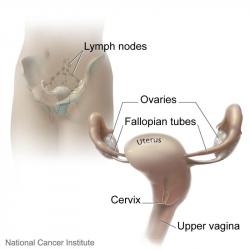Most commonly, progesterone is requested during the investigation of infertility, to look for the presence of ovulation. It may also be used to help diagnose an ectopic or failing pregnancy or in the investigation of abnormal uterine bleeding.
Progesterone Test
At specific times during a woman’s menstrual cycle (period) to determine whether/when she is ovulating and producing eggs, and sometimes during early pregnancy if symptoms suggest an ectopic or failing pregnancy
A blood sample taken from a vein in your arm
None
-
How is it used?
Since progesterone concentrations vary predictably throughout the menstrual cycle, measurements can be used to help diagnose infertility problems. Progesterone measurements can determine if and whena woman has ovulated (released an egg from the ovary).
In early pregnancy, progesterone measurements may sometimes be used to help diagnose an ectopic pregnancy or failing pregnancy (one leading to miscarriage). NICE however recommends the use of ultrasound scanning along with human chorionic gonadotrophin (hCG) testing in the diagnosis of early pregnancy problems rather than measuring progesterone.
-
When is it requested?
Progesterone concentrations may be measured:
- As part of an infertility assessment, when a woman is having trouble getting pregnant and the doctor wants to verify that she is ovulating normally. The timing of sampling will depend on the lenght of the menstrual cycle.
- To determine if and when ovulation has occurred following drug therapy to induce ovulation, as part of fertility treatment.
-
What does the test result mean?
Interpretation of progesterone test results requires accurate knowledge of where a woman is in her menstrual cycle or pregnancy. Progesterone concentrations in the blood usually start to rise when an egg is released from the ovary, continue to rise for several days, and then either continue to rise with early pregnancy or fall to start menstruation.
If progesterone concentrations do not rise and fall on a monthly basis, a woman may not be ovulating or having menstrual periods. If concentrations do not rise normally during an early pregnancy, the pregnancy may be ectopic and/or may be failing.
Levels of progesterone will be naturally higher during pregnancies that involve multiples (twins, triplets, etc.) than those in which there is only one fetus.
-
Is there anything else I should know?
-
Are men tested for progesterone?
-
Are there other uses for progesterone?
Yes. Progesterone (in the synthetic form progestogen) is used in hormone replacement therapy (HRT) for menopausal women who still have a uterus (not removed by hysterectomy) . For more information, read the NHS Choices pages on HRT. Progesterone is also used in some contraceptive pills.
-
If I am menopausal and on hormone replacement therapy (HRT), is there ever a need to monitor my progesterone level?



